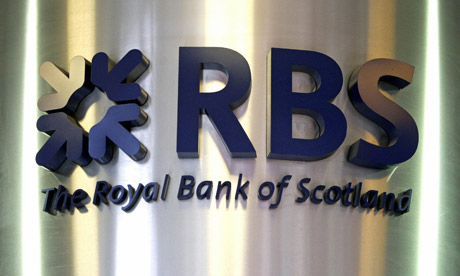To fresh up your ‘RBS memory’:
– RBS chiefs handed £5m in bonuses, paid by the taxpayer
– Sir Fred Goodwin received £2.7m pension lump sum tax-free
– Ministers ‘to sue’ RBS directors over Sir Fred Goodwin’s pension
– RBS avoided £500m of tax in global deals
– The 1.3 trillion pound bank job
– RBS posts record £40bn pre-tax loss
– Bailed-out banks to add £1.5 trillion to public debt

Ruthless Banksters of Scotland
• Profits rise from £1bn to £5bn in Royal Bank of Scotland’s investment banking division
• Chief executive insists taxpayers will get £20bn share investment back at a profit
Taxpayers will lose out if Royal Bank of Scotland is unable to pay bonuses, its chief executive, Stephen Hester, claimed todayas he lamented the intense public scrutiny faced by the bailed-out bank.
As the bank’s shares fell 12% to 46.99p, Hester defended the bank’s need to pay bonuses after losing more of its best staff. “We must pay competitively because we must have good people and every taxpayer in the country should care about us having good people because without that we won’t have the outcome that everyone needs,” Hester said.
An increase in profits from £1bn to £5bn in the investment banking arm prompted speculation that RBS bankers were on track for big bonuses by the end of the year. Investment banking dominated the interim profits, which showed a £15m statutory profit, although Hester focused on the “poor” net attributable loss to shareholders of £1.1m.
Hester, whose £9m pay deal delivers if the shares reach 70p in three years, said the bank had suffered a “damaging but not yet destructive” exodus of staff. He said some guaranteed bonuses were being paid, but that they complied with the demand by the Financial Services Authority of being for no longer than 12 months.
There would be no cash bonuses and any payments made in complex bond packages would be subject to clawback. Barely eight months into a five-year turnaround plan, he insists the taxpayer will get its £20bn share investment back at a profit so UK Financial Investments, which owns the taxpayers’ 70% stake, would need to sell out above 50.5p. For every penny the shares fall below that level, the taxpayer loses £400m.
Hester also expressed frustration about the scrutiny over bonuses and other business practices, such as corporate hospitality at Wimbledon.
“We sometimes feel as if commentators variously want us to go back to over-lending, to operating on a not-for-profit basis, to never entertain a client, to offer employment conditions that deter the best and the brightest. Oh yes, and at the same time to pull off a recovery enabling taxpayers to recoup the support given. Thankfully, our serious engagement with the government, central banks, regulators, customers and other political parties is generally more balanced and insightful,” he said.
RBS rounded off the interim reporting season on a more cautious note than rivals, particularly Lloyds Banking Group, which said its bad debts had peaked at £13.4bn. He was not prepared to make the same pledge for the £7.5bn charges at RBS, which took the total written off by the UK’s banks in the first half to £35bn.
“The green shoots are short in duration and you need to be cautious about over-interpreting them too quickly,” he said.
The bank is having difficulty meeting its commitment to lend £16bn to businesses and warned that the EU might force it to scale back its business bank, which has a 30% market share, in return for participating in the government’s asset protection scheme. The bank had turned away 30,000 business applicants which, at 15%, is the same rate as last year.
Parachuted in when Sir Fred Goodwin was ousted during the bailout, Hester has split the bank in two. The core business – where operating profits were £6.2bn, up 33% – contains the high street bank, insurance operations and investment banking; a non-core business contains troubled operations and those earmarked for disposal, where the loss widened to £9.6bn. American banker Bruce Van Saun becomes finance director.
Hester is on three-year pay deal but pledging a five-year turnaround. Asked how long he intends to stay, he said: “My analysis of the statistics for people in my job is you normally get fired so I’m assuming that will happen to me one day, so the longer away from now the better.”
Jill Treanor
Friday 7 August 2009 20.07 BST
Source: The Guardian